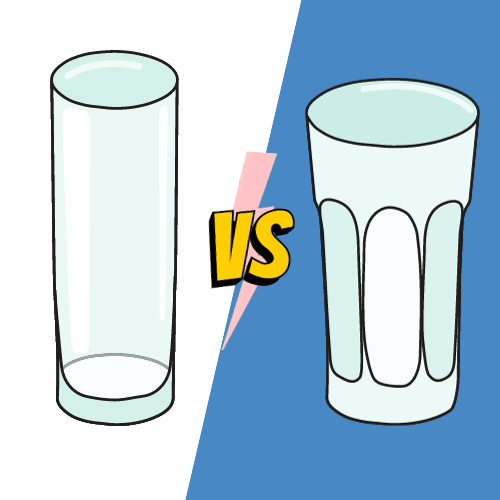Facebook Print Email WhatsApp Published: 01/19/24 Table of Contents The Dirty Martini, a captivating and flavorful twist on the classic...

Collins Glass
300 to 410 ml in volume
Designed for beverages that involve a composition of more than two components.
Utilized for beverages containing both ice and a carbonated element.
Taller and narrower than a highball glass
Highball Glass
240 to 350 ml in volume
Designed for beverages consisting of two components, comprising solely a spirit and mixer.
Utilized for beverages containing both ice and a carbonated element
Shorter and wider than a highball glass
In the world of glassware, the Collins glass and the highball glass often find themselves in a confusing of mistaken identities. While their similarities in shape might lead one to think they’re interchangeable, a closer inspection reveals distinct characteristics that set them apart.
The Collins Glass, named after the iconic Tom Collins cocktail is characterized by its chimney-shaped structure and is distinguished by standing taller than its highball counterpart. The height discrepancy not only adds an aesthetic dimension to the glass but also plays a pivotal role in enhancing its functional versatility. The most notable feature is its generous capacity, typically ranging from 300 to 410 ml. This generous size makes it the go-to choice for mixed drinks and cocktails that require a bit more room to shine.
The Collins glass, with its elongated and slender profile, contributes more than just aesthetic appeal to the drinking experience. One notable advantage lies in its ability to prolong the carbonation of beverages. The reduced surface area of the drink, owing to the taller and narrower design, minimizes the exposure to external elements, helping to preserve the effervescence of carbonated drinks for a more extended period.
The Highball which often can contain around 240 to 350 ml, embraces a more pragmatic approach to cocktail presentation, favoring simplicity and functionality. With its wider opening, it facilitates easy pouring and stirring, making it a bartender’s favorite for quick and efficient preparation of popular highball cocktails. The reduced height also ensures a lower center of gravity, making it less prone to tipping over – an important consideration in busy bars and social settings.
The Highball glass was designed specifically to align with its intended purpose – for the presentation of lofty cocktails and mixed beverages topped by a substantial volume of non-alcoholic mixers or carbonated components. Its towering structure accommodates a two-layered composition of components. This glassware choice is often preferred for cocktails like the classic Whiskey Highball (hence the name) Cuba libre, or a Scotch and Soda. The slightly limited capacity of the glass encourages the drinker to savor the nuanced flavors slowly, making it an excellent choice for those who prefer a more measured and deliberate imbibing experience.
Our Team
Hi, we’re mixdrinkipedia team. Welcome to our cocktail corner of the web, crafted by our dedicated team, passionate about everything that makes mixology magical. We’re a group of enthusiasts and professionals, blending our diverse skills and backgrounds to create a space where the art of cocktails is celebrated from intricate recipes and deep dives into the history of cocktails to reviews on the latest in bar tools. Join us as we explore the art and science of mixology, one sip at a time.
Newest Recipes
Facebook Print Email WhatsApp Published: 01/19/24 Table of Contents The Dirty Martini, a captivating and flavorful twist on the classic...
Table of Contents The Adonis Cocktail, a careful blend of sherry and vermouth, draws inspiration from both classic cocktail traditions...
Table of Contents The Mezcal Manhattan is a delightful riff on the classic Manhattan cocktail. The Mezcal Manhattan swaps out...
Facebook Print Email WhatsApp Table of Contents The classic Margarita has long been celebrated as a timeless and iconic cocktail,...
MixDrinkiPedia.com is a participant in the Amazon.com Services LLC Associates Program. As an Amazon Associate we earn from qualifying purchases. Amazon and the Amazon logo are trademarks of Amazon.com, Inc. or its affiliates.